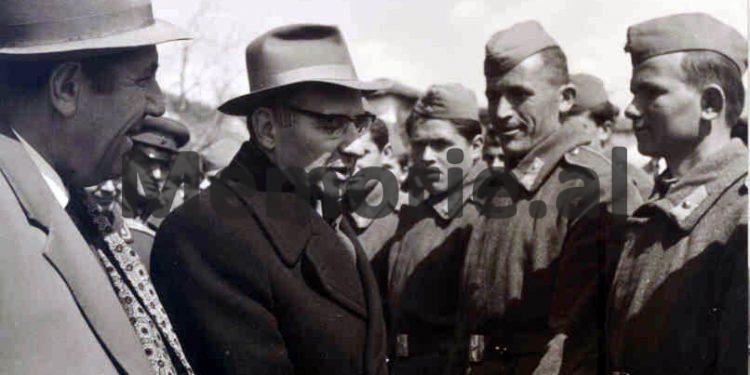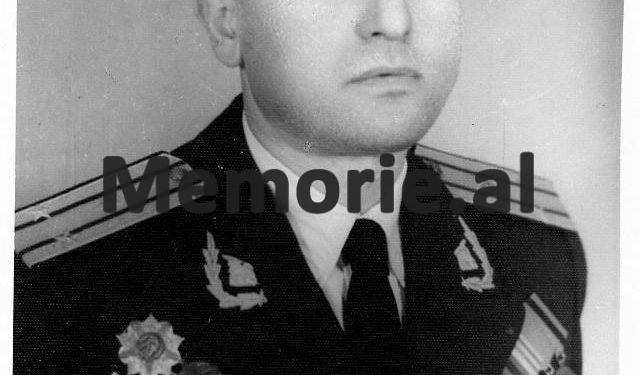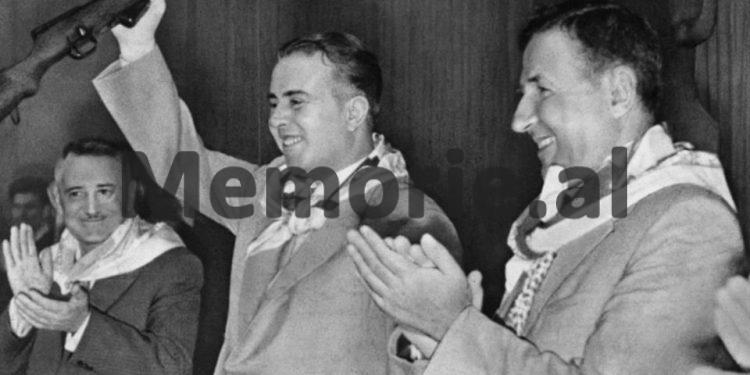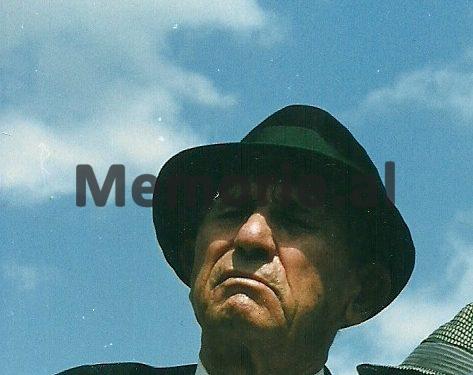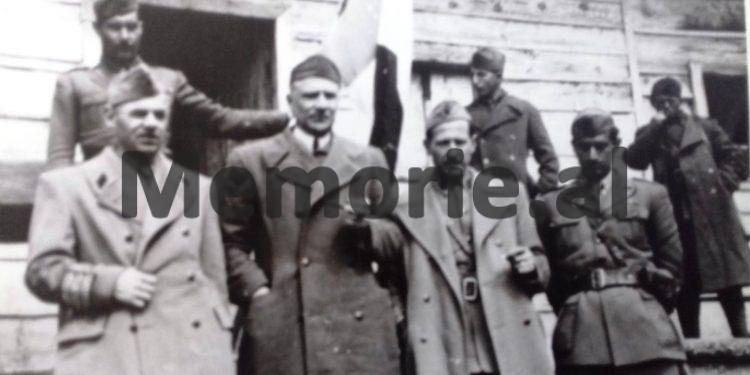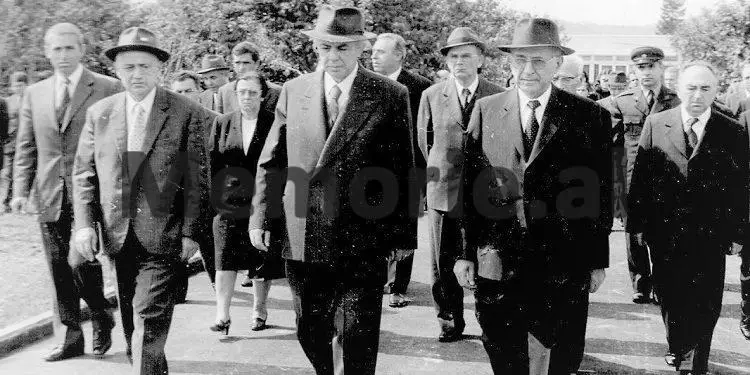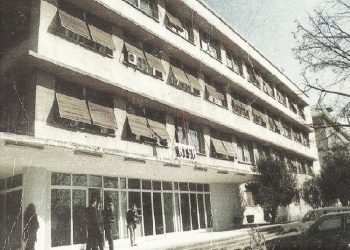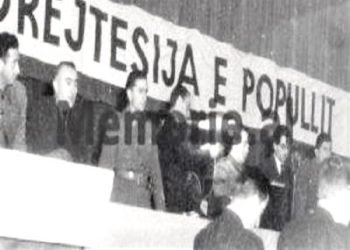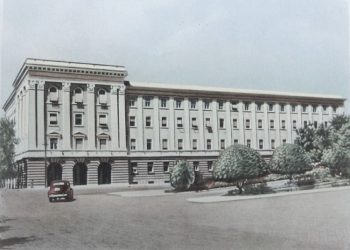Dashnor Kaloçi
Fifth part
Memorie.al publishes the unknown testimonies of Colonel Idriz Seit Sadikaj, former senior State Security soldier at the Ministry of Internal Affairs and Mehmet Shehu’s closest collaborator since childhood when they were close friends in the village of Çorush Mallakastra, who in 1982 was sentenced to 10 years in political prison, as well as the testimonies of former senior State Security officers TN of M.Gj. who have served for many years at the former secretary of the Central Committee of the ALP and member of the Politburo, Hysni Kapo, who covered the organs of the ‘Dictatorship of the Proletariat’, such as: the Ministry of Internal Affairs, the State Security, the Ministry of Defense People’s Courts, Courts, Investigations, Prosecution, etc. Their rare testimonies on the mysteries of Hysni Kapos’s death in Paris, Vito’s accusation against the Minister of Internal Affairs, Kadri Hazbiu, as well as the possible scenario of Enver Hoxha for the elimination of Kapos and Shehu since 1973, when Hoxha passed a severe heart attack and his life was questioned, and for that, he initially blamed his doctors who had suggested and approached Hysni Kapo!
“In September 1979, after learning of the death of Hysni Kapos in one of the medical clinics in Paris, where he had been hospitalized for a few days and was being treated for a serious illness, his wife Vito Kapo immediately met the Minister of Internal Affairs, Kadri Hazbiu and in the midst of tears and sobs, addressed him shouting: ‘Why did you poison Hysni ?!’ After this very strong and very shocking accusation that she made against him, Minister Hazbiu, completely restrained and he calmly replied: ‘What do you have that you address me, why do not you tell him ?!’By the word ‘him’, Hazbi was referring to Enver Hoxha. The subtext of the response of Kadri Hazbiu, a very refined and intelligent man, who had headed the organs of the Ministry of Internal Affairs and State Security since 1949, was more than clear to Hysni Kapos’s wife, who until then was the ‘two’ of communist Albania and was considered one of the main and most likely people to replace Enver Hoxha after his death.
That very short answer that Kadri Hazbiu gave to Vito Kapos against her accusation, spoke a lot! Hazbi did not claim that her husband, Hysni Kapo, had been poisoned, but she did not deny it either! But he, excusing himself that he had no finger or that he was not implicated in what Vitua was accusing him of, inadvertently letting her know that: he had no objections to her accusation, but the address was wrong and that accusation should have been directed not at him, but at Enver Hoxha. ”
This is what the retired colonel and former political prisoner, Idriz Seit Sadikaj, said, in his testimonies with the sensational story about the mystery of the death of Hysni Kapos, the most powerful man of the Albanian communist state who held the post of Secretary for years. of the Central Committee of the ALP and the most trusted man of Enver Hoxha (as secretary of the Central Committee, he had the functional task of controlling the organs of the Dictatorship of the Proletariat, the Ministry of Interior, Defense, Prosecution, Investigation, etc.), which for the first time is made public by Memorie.al.
Also, in his testimony, Idriz Seit Sadikaj, recounts his conversations with one of the former senior officers of the State Security (TN), who for many years, has accompanied for medical visits to Paris, the most senior senior leadership of the Politburo and the Albanian communist state.
But what is the truth about the death of Hysni Kapos and is there any other evidence that sheds light on it? Why Kapos’s closest man (M.GJ.) who had stood by him for 35 years, after the death of the chief, with tears in his eyes, told his most trusted people, who at that time were in positions of high in the Ministry of Interior: “They disappeared Hysni ?!
How did the response to Hysni Kapos’ medical tests performed at the Central Laboratory of the University Clinic of Tirana come about, what did the Security officers say to the laboratory doctor who performed those tests and why did she keep it secret for 20 years?
Why did Ramiz Alia, the man who was sent by Enver Hoxha to stay with Hysni in Paris, shortly before his death, remove from the room the Albanian escorts and doctors who served him?
Why did Enver Hoxha care about the elimination of Hysni Kapo and what did Enver say on the anniversary of Ramiz Alia’s birthday, in 1969, and why did Hysni Kapo and Mehmet Shehu “blacken” after those words that meant a certain testament he was leaving for the successor of his?!
Why at the end of 1973, under the auspices of Nexhmije Hoxha, one of the instructors of the Central Committee of the ALP published two articles in “Zeri i Popullit”, regarding the faction of Sadik Premte, treating and describing as’ hostile activity the failure of the defeat of that faction ‘, for which at that time Enver Hoxha had directly charged Hysni in Vlora and Mehmet in Mallakastër?
What tasks did Enver assign to Hysni and Mehmet at that time and who were the people they had to execute without trial in Vlora and Mallakastër? Why was Enver Hoxha’s order for the execution of the leaders of the Vlora District, which had been given since the spring of 1942, dragged on for a year by them, so much so that they forced Enver to go to Vlora himself?
Why did the villagers of Gjormi arrest Hysni Kapo when he went to carry out the kidnapping and execution of “Xhepi” (Sadik Premtes) and Pali Terova? Why in 1943, Enver Hoxha told “Sazan”: “You did very well to kill” Dyshek “and” Milon “because that would have been done by any obedient communist of the party”, and in the early 1970s- In the two articles published in “Zeri i Popullit” under the auspices of Nexhmije Hoxha, they were declared “Martyrs of the Fatherland”, and in their motivation, it was said that they were “killed by the enemies of the people and the party”? !
Why did Mehmet Shehu “burn” those two articles, thinking that Enver was preparing the ground for a possible blow against him and Hysni Kapos (a scheme which had worked and in the elimination he had done in the past to his closest collaborators and to his deputies, such as: Nako Spiru, Koçi Xoxe, Bedri Spahiu, Tuk Jakova, etc.) and he handed Enver Hoxha the two letters, where his closest man, “Sazani” denounced those two articles ?!
Why did Mehmeti calm down when the Secretariat of the Central Committee, which met after two letters from “Sazan”, declared him “Martyrs of the Fatherland”, “Mattress” and “Milon” who were killed at the Kuta Mill and told Seit to did not bother that issue anymore ?!
Why in 1982, Enver Hoxha accused Mehmet Shehu as if he had deliberately sabotaged the defeat of Sadik Friday’s faction, cunningly plotting the “incident” of the Kuta Mill, for which he himself in 1943, at Mehmet’s house in Çorush, had thanked “Sazani”?!
On these and other mysteries of the main trio of the leadership of the Albanian communist regime: Enver Hoxha, Hysni Kapo and Mehmet Shehu, we will be known through the testimonies given to us some time ago by Idriz Seit Sadika (with the nickname of the war “Sazani”) former colonel in the Ministry of Interior and one of Mehmet Shehu’s closest collaborators since the time of the War, as well as the testimonies of some former senior State Security officers like M.GJ. etc., who have served for many years near Hysni Kapos.
How did Enver Hoxha act to hit Hysni Kapo and what was the event he was caught for which at the end of 1973 when his life was put in great question due to the serious illness he went through, he began to prepare the terrain and the scenario of elimination of his two closest collaborators implicating them in hostile activities ?!
Continued from the previous issue
Seiti: Mehmeti gave me a copy of the program, but after correcting it!
“On the document with the outline-political program that I submitted to him; Mehmeti wrote: ‘I did this before I got in touch with the Communist Party.’ After that, I told him that if he had the opportunity, he would give me a copy of that document. Mehmeti asked me why I loved him and I told him that I wanted to have him as a memory, from my war commander. So, he got the original of that program and after a while, he sent me a copy of it. But unlike the original, in the photocopy he gave me, he had changed the title of the program. In the title of the photocopy, it was written: ‘SKETCH-POLITICAL PROGRAM’ August 1942, while in the original that I handed over, the title was: ‘What will come out after the liberation, from this war that the people are waging’?! Likewise, instead of a copy of the program he gave me, he had made some corrections, which made it impossible to read the text in that place. What was most important, that Mehmeti had written in the copy of the program he gave me, was the note he had made with his writing on the last page. That note states:
This political outline-program (for the People’s Revolutionary Government that would emerge from the National Liberation War), I wrote in August 1942, in Çorush (Mallakastër), I had just returned home from exile (the Spanish War and field of concentration of France) and before contacting the Vlora Regional Party Committee. I used it before this contact, to explain to the villagers, among whom was Idriz Seiti (who was then illegal for ordinary issues, but who later came as a partisan with me and today is a staff member in the Ministry of Internal Affairs). As I conceived then the purpose of the National Liberation War of the Albanian people, without having contact with the Albanian Communist Party. Then, this sketch was no longer used by me and it was preserved by Idrizi, and I had completely forgotten. Recently Idriz Seiti handed me over.
Tirana 15.2. 1973 Mehmet Shehu
In this note Mehmeti had made two underlinings. The first underlining was made of the word ‘before’, in the sentence where it was said that he had used that program before contacting the Vlora District Party Committee, while the second underlining was made of the sentence “… without having received yet contact with the Albanian Communist Party … “, Idriz Seiti recalled, Mehmet Shehu’s note, in the photocopy of the document he handed him and the underlines he had made there.
The dangerousness of the political program!
But how did Mehmeti receive the delivery of that document with the political program, by his War comrade, and did he pose a danger to him at the time, knowing that its contents were completely contrary to the Party line? Although Idriz Seiti did not want to comment on these hypotheses, from the very conversation he had with his former commander, who was then prime minister, and the notes he made to the copy of the document he donated to him. , it is clear that Mehmet Shehu, waited for the delivery of that program as a “time mine” that would explode in his hand from moment to moment. From the astonishment that Mehmeti had expressed, when his friend handed him the document, asking him: How did you save it? it seems clear that he would like that program to be gone forever and its release after 30 years, it seems that shocked him. This is reinforced by the other fact, when Mehmeti asked Idrizi why he wanted the copy of that program, which expresses his suspicion that he was not in front of any provocation. This suspicion must have made Mehmet Shehu not ask his friend, Idriz Seiti, for the disappearance of that program, which seemed to complicate matters worse and put him in front of a fact committed with incredibly dangerous consequences! Mehmeti, after sifting through the situation he was in, found a solution, which he thought would pose less of a risk to him. It was the note in the photocopy of the program, which he would deliver to Idrizi. From the very note that Mehmeti made to that program and the underlines under the words that ‘he wrote it before he got in touch with the Albanian Communist Party’, it is clear that that program, although written in 1942, was quite dangerous for the Albanian Prime Minister, from his own social-democratic content, which completely contradicted the line of Enver Hoxha’s Party. Mehmet Shehu’s concern about the release of that program seems to have been more than clear, which was confirmed a few months after the enigmatic death of the Albanian Prime Minister, when Enver Hoxha would declare that: “Mehmet Shehu, you were found in the safe his highly compromising material”.
Enver: Idriz Seiti, the spy of fascism
But how did the events unfold afterwards with Idriz Seiti, the man who was considered one of the closest associates of the assassinated former prime minister and declared an enemy? In this regard, he recalled: “After I was relieved of my duties as a senior military officer in the Ministry of Internal Affairs and I was retired, a State Security surveillance began against me. At the end of October or the beginning of November 1982, the Plenum of the Central Committee of the ALP was held, where Enver Hoxha and all his followers criticized and unmasked Kadri Hazbiu, considering him a close collaborator of the enemy. Mehmet Shehu ‘. In that plenum, I was also mentioned as a ‘close collaborator of Mehmet Shehu’. I do not remember well if it was Enver Hoxha or Ramiz Alia, the one who stood up at that meeting and said: ‘Idriz Seiti was a spy of fascism, with the duty to wait for Mehmet Shehu, when he returned from France, as he received him and helped him ‘. Also, in that plenum, Enver Hoxha said: ‘In the safe of the enemy Mehmet Shehu, compromising materials were found, which prove that he has been an agent since the time of the War. In a political program devised by him since 1942, he does not say a word about the SNP and presents himself as too opportunistic. After the words that were said about me in the Plenum of the Central Committee of the ALP, my problem was taken over by the Prosecution, which in a meeting with the people of Ballsh, under the pretext of a popular investigation, raised all charges against me, repeating what was said at the meeting of the Plenum, that ‘I Idriz Seiti, I had been a spy of fascism, with the duty to wait and help Mehmet Shehu’! I was in Vlora that day and I learned this from the people of my family who called me about what was said in Ballsh “, recalled Idriz Seiti, the accusations made against you at the Plenum of the Central Committee of the ALP and the unmasking you did before the people of Ballsh.
Arrest of Idriz with armored car!
What happened to Idriz Seiti after the accusations made against him at the Central Committee Plenum and the unmasking in front of the people in Ballsh? Regarding this, Idrizi recalled: “On November 19, 1982, I was going to a meeting of the veterans’ party organization, which was to be held in a hall near the Republic Guard. As I was going there, before the meeting started well, they addressed me, saying: ‘Idriz Seiti, enemy of the people and of the party, hand over the ticket’. After those words, the hall where the meeting was being prepared was held, surrounded by some Special Forces champions, by three or four vehicles of the Ministry of Interior that accompanied them and an armored car. All this arsenal of people and combat techniques was done to show the people, the danger that I allegedly presented as an enemy of the people and the party. After that, I was sent to the Tirana Investigation, where the investigation process started against me with a group of three investigators, who accused me of being a ‘group’ with two other people, who were Qamil Mane Islamaj and Duro Ismail Shehu, Mehmet’s brother. Shehu. The main accusations against me were: ‘Enemy and spy of fascism, a close collaborator of Mehmet Shehu, who maintained and propagated his social-democratic program. The spy of the Yugoslavs and Dusan Mugosha ‘. They supported these accusations in the letter with the political program of Mehmet Shehu, as well as another letter, which was sent to me by Dushan Mugosha during the war. I was also accused of ‘hostile activities that during the war, instigated and in collaboration with Mehmet Shehu, had sabotaged the party line by putting at the head of the national liberation councils, exponents of reaction and fascism’. For this accusation, the investigation was based on the Ballsh meeting of 1942, organized by Namik Kamani, where Bilbil Klosi and Mehmet Shehu called on the Mallakastriot nationalists, who were then working in the administration of the fascist government, to join the Anti-Fascist War… (After that, Bektash bej Cakrani, became the chairman of the Antifascist National Liberation Council and for this meeting, after the war, a memorial plaque was placed in the house of Namik Kaman). But the main accusation against me was about the political program. In this regard, the indictment of the prosecution stated: The hostile position of the defendant Idriz Seiti to the detriment of the party line, is confirmed by the found documentary materials, which have been preserved to achieve his counter-revolutionary goals. Defendant Idriz Seiti, in addition to the hostile program of the enemy Mehmet Shehu, has preserved other hostile documents, the content of which is contrary to the party line, its orientations and directives. Following these allegations by the prosecution, on December 28, 1883, at the Military Criminal College of the High Court, a trial was held against me and Qamil Mane Islamaj and Duro Ismail Shehu. In this trial, I was sentenced to ten years in political prison, on the charge that: ‘I had done agitation and propaganda while preserving and propagating the social-democratic program of the enemy Mehmet Shehu and that I had unjustly raised his role and cult’. After that I was sent to serve my sentence in Burrel prison, while my family was deported to Paftal in Berat and she was subjected to a very harsh persecution. “Of the three amnesties granted to political prisoners by the People’s Assembly in 1982 and 1986, the 89th, although I was entitled to release, this law was not implemented for me,” the former colonel concluded. of the Ministry of Interior, Idriz Seiti.
Seiti: Mehmeti leaned to the right
But what is Seit’s opinion about the former Prime Minister Shehu, from whom he had many misfortunes in his life? In this regard, he said: “If you analyze all the activities of Mehmet Shehu, from the time of the war until December 1981 when he was killed in the bedroom of his villa, I conclude that he had a social point of view. -democrat and was more democratic than communist, which is confirmed by his program. But for the very course that the War took and the policy that Enver Hoxha followed afterwards, he was not able to implement the program he had drafted. Not everything that is said about Mehmet is true, that he was a criminal. Enver Hoxha attributed these things to him, after physically eliminating him. It is not true that Mehmet Shehu ordered the shooting of 67 Ballista prisoners in the village of Matjan in Lushnja in 1943. Mehmet was not at that event at all and did not even know what was happening there, but that was attributed to him during War and then, for the reason that he was the Brigade Commander. That massacre was committed by order of Dushan Mugosha and its executor physically disappeared after some time in the Skrapar district. Dushani was a born criminal and in his speech on the day of the inauguration of the First Brigade, he said: ‘Even if a single double is fired against our Brigade, know very well that in that village not even the kilims will survive. ‘. One of Mehmet’s weaknesses was Kosovo, which he had in mind in his program when he says that: after the war, the problem of minorities will be reconsidered, solving that problem peacefully according to the principle of the right of the people’s themselves’. Another fact that reinforces my conviction that Mehmeti was for social democracy, is the self-criticism he made in front of the Politburo, a few hours before his assassination, where he says, among other things: I slipped my right foot, but Comrade Enver and the other comrades did not let me fall to the ground. By this Mehmeti meant that he had slipped to the right “, concluded Idriz Seiti, his convictions for the former war commander and the Albanian prime minister, who was found killed in mysterious circumstances on December 18, 1981, after the conflicts with Enver Hoxha. /Memorie.al




